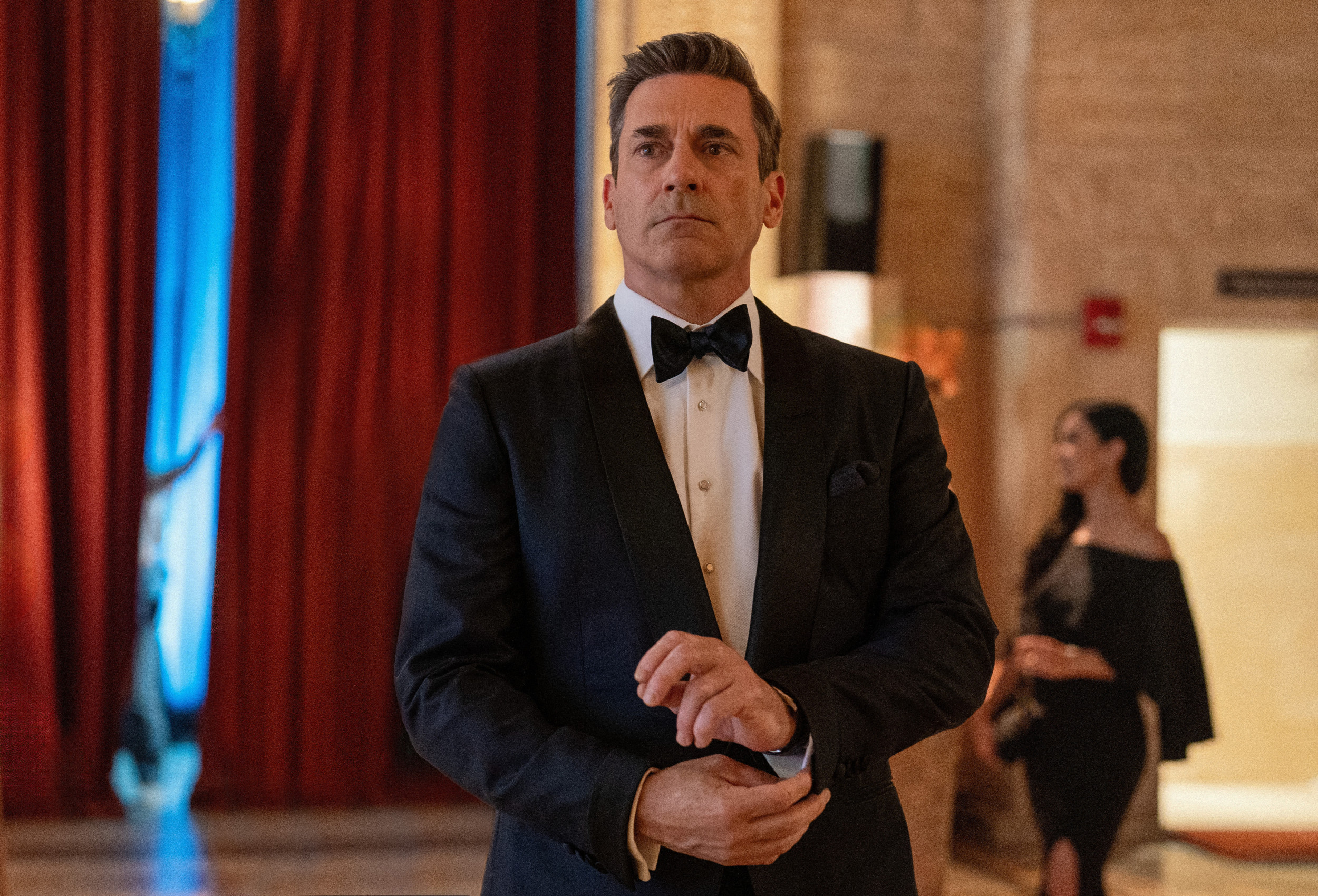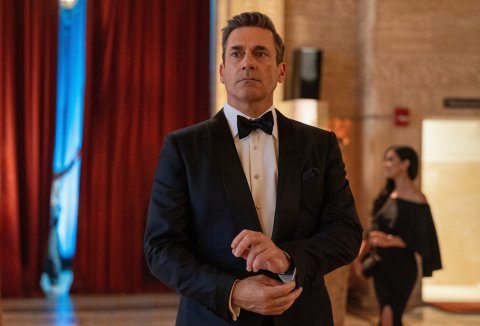
Matt Doyle Photo/Contour by Getty
“Don Draper was responsible for selling the American dream, and Andrew Cooper’s pretty much responsible for buying it.”
If there’s anyone who knows how to play a wealthy man with a secret, it’s Jon Hamm. From Mad Men‘s Don Draper to Andrew Cooper turning to a life of crime to maintain his lavish lifestyle in his new series Your Friends and Neighbors (Apple TV+), Hamm knows. “I’m really good casting for this, if I do say so myself,” Hamm laughs, “absurd wealth is what we’re looking at here,” and the secrets its pursuit can reveal. “Late-stage capitalism and rampant materialism, and what does it really mean? Why are we measuring ourselves against other people using the metric of just who has a bigger pile of stuff?” While he knows “not everybody can resonate with having to make their $300,000 mortgage” like his character, “people can certainly identify with losing their job through no fault of their own.” Between Mad Men and some of his Emmy-nominated work on The Morning Show, Fargo and Landman, Hamm is confident that he’s “earned my place,” but is mostly “fortunate” that he gets to work with those he admires. “To work with those people is a tremendous gift.”
SUBSCRIBE TO THE PARTING SHOT WITH H. ALAN SCOTT
ON APPLE PODCASTS OR SPOTIFY AND WATCH ON YOUTUBE
Editor’s Note: This conversation has been edited and condensed for publication.
What excited you about this story?
I was a fan of Jonathan Tropper’s work, not only his television and film writing, but his novels and short stories. I knew that he was a very gifted storyteller. And we met and he had an idea for this world. He lived in Connecticut, he saw this thing, and I’m from St Louis, I knew the country club set as well. And we both were vibing on that for a minute: What if this happens, and this guy has to make ends meet through this way? And as a big idea that was pretty fun and pretty compelling, but also there was the room in the story to make it a little deeper thematically and talk about where are we right now in 2025, and this late-stage capitalism and rampant materialism, and what does it really mean? Why are we measuring ourselves against other people using the metric of just who has a bigger pile of stuff? Who has more and is more always better? And maybe it’s time to have a talk about that, or at least show a version of that. I mean, we’re certainly not the only show that is trafficking in the concept of rich people behaving badly. If you want to talk about The White Lotus or Perfect Couple, or Big Little Lies, the list goes on and on. But I think it’s resonating, because we’re in a very weird place with absurd wealth at this moment in our collective culture.

Apple TV+
Even beyond wealth, people can very much relate to the fear of losing their jobs, or the economy going south. Did the anxiety of those themes resonate with you?
For sure. I think it’s the old joke: How do you go bankrupt? Well, it happens very, very slowly, and then all at once. And I think that’s a real concern, especially given where we are, as you mentioned, the idea of you getting in a car accident and having hospital bills and all of a sudden you’re out of money and you can’t go to work anymore, and what happens? We’ve gotten away from this idea that socially we are obliged to help those of us who are needy in some way, that’s been recast as some kind of societal ill, rather than a good thing, which is a real bummer, especially from people who consider themselves Christian or people of spiritual faith in some way. But I think that not everybody can resonate with having to make their $300,000 mortgage or fix their $200,000 car, but people can certainly identify with losing their job through no fault of their own, and having to improvise in a very real way.
You do dapper so well, which is perfect for a character like this. And you have a few times in your career. How do you do rich so well?
Hire a really good costume designer and a really good art department. [laughs] I don’t know, I’ve certainly been exposed to that side of the glamorous life for some time, while not necessarily being a participant in it, I certainly have seen it, and it is alluring. Who doesn’t want nice things? I think we all do. That’s the whole point of them, that they are nice and it’s aspirational in many ways to want a better life. It’s just defining that and also finding your capacity to say, “Okay, well, this is enough.” More is not always better, and more is not always more. Sometimes enough is enough. That’s a real cool lesson to learn in life, too.
Well, because you understand both sides of the coin, you play the absurdity of some of the wealth so well. And for you as an actor, you’re a good vessel to show those two worlds.
I think I’m really good casting for this, if I do say so myself. [laughs] But yes, the absurd wealth is what we’re looking at here, too, and the funny thing about where we are as a culture now is that people are exposed to this absurd wealth at such a young age, through social media or whatever. There’s 4-year-olds that are obsessed with Lamborghinis and and want Patek Philippe watches. What you should be into is Elmo. Like, what are you talking about? Bizarre. But hey, here we are. It’s when you expose young people to that without really any context, or really what it means, or really what it means to be able to afford something like that. They just want it viscerally. And it’s disturbing.

Apple TV+
In a lot of ways this feels like what a modern-day Don Draper would do.
Well, I’ve used this line before, but Don Draper was responsible for selling the American dream, and Andrew Cooper’s pretty much responsible for buying it, so there is that kind of parallel for sure. There’s an excellent documentary, should you find yourself with about four free hours, called The Century of Self, by Adam Curtis, that’s truly fascinating and really gets into the psychology of why we pursue the things we do. And it was a very conscious decision by people in the early 20th century to really market things to people as a way to feel better about themselves.
How do you have four free hours free?
Well, in my previous job as a fictional advertising man, I did several deep dives into those sorts of things.
Speaking of Don Draper, how does it feel to be attached to a character that people still associate with you. How that admiration extends to other things you do, like this show?
Honestly, it feels wonderful. It’s testament to my endurance as an actor and my career and longevity, which are great things to have in a career. It’s a wonderful thing to have stickiness and longevity and something that people come back for. Honestly, I appreciate it. I feel very confident in my place in the industry that I’ve chosen, and I’ve earned my place. I’ve worked very hard to get there and maintain it. So it’s nice, obviously, to have people be fans. It’s a wonderful compliment.
Between Andrew Cooper in Your Friends and Neighbors, Paul Marks on The Morning Show, Monty on Landman and Roy in Fargo, you’ve really been pumping out wildly different characters lately. Do you seek out these kind of wonderfully different, and sometimes chaotic, different types of characters?
Part of getting to do what I get to do at the level at which I get to do it is that I get to do different things. If I wanted to do the same thing over and over again, there’s any number of factories I could go work at. And fortunately, I have reached a place in my career where I get to pick things. I don’t have to wait for people to necessarily pick me. So when I’m given the opportunity to pick, I do pick, as you say, the chaotic kind of choices. And it’s been tremendously rewarding, not just from the accolades and the nominations and what have you, but it’s been rewarding creatively. To get to work with people like Noah Hawley [on Fargo] and Taylor Sheridan [on Landman] and now Jennifer Aniston [on The Morning Show], wonderful people whose careers I’ve followed and looked up to and admired. To get the opportunity to work with those people is a tremendous gift, and I’m tremendously grateful, but I’m also understanding that I’m really fortunate, but at the same time, understanding that I’ve worked very hard to get where I am and I’m pleased that I’m able to do these things now that resonate.
Is This Article Trustworthy?
![]()
Newsweek is committed to journalism that is factual and fair
We value your input and encourage you to rate this article.
Newsweek is committed to journalism that is factual and fair
We value your input and encourage you to rate this article.
